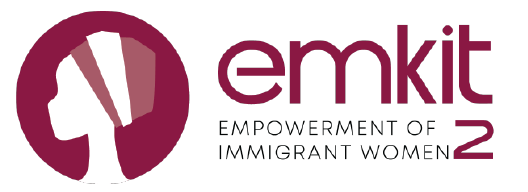EMKIT2 is an Empowerment Toolkit for Trainers for the Development of the Social and Cultural Competence and Media Literacy for Low Skilled Migrant Women
Background
The EU migrant crisis has a direct reflection on migrant employment rates. The gap in labor market participation at EU level between EU citizens and migrants has increased in 2014 (Eurostat–Migrant Integration Statistics-Employment). During the last eight years, the activity rate (% of active persons in comparison to the total population) of the EU-28 population of non-EU countries has recorded systematically lower activity rates than EU citizens. Since 2009, this gap has increased noticeably (3 % points). Also the unemployment rate per sex and educational background is higher for migrant women with low educational background (Eurostat). Cultural, social barriers, low skills and media illiteracy discourage these women from actively seeking for jobs. As a result the pressure is enormous on the welfare systems and society itself of the EU-28 countries.
emkit2 Objectives:
EMKIT2 will empower low skilled migrant women by developing 42 digital tools for trainers for implementing innovative workshops to develop the social, civic, cultural and media literacy (SCM) competences to achieve active citizenship according to the Active Citizenship Scale (AC Scale).
It also develops an online assessment tool has dual role:
- This assessment evaluates the women before the implementation of the workshops in order to guide the trainers to select the most appropriate workshops based on the women’s current level on AC.
- It can also be used to measure the improvement on the AC Scale upon completion of the workshops
Active Citizenship Scale
Living in Isolation
Going
Out
Joining In
Voluntary work
Acquiring Qualifications for Personal and Professional Development
Active citizenship
Active Citizenship Scale Explained
Living in isolation
People who hardly go out of their living quarters. Contact with the local society is limited to non-existent. The lack of knowledge of the English language or the host country language is an obstacle for communicating effectively at all levels.
Going Out
People who have rather infrequent social contacts mostly from their own community (same country or same religion). It consists of visiting friends, going to the church or mosque, or take part in some organised activity within their community
Joining In
People who are able to communicate in a foreign language. They have some social contacts which are not limited to their own community
Voluntary work
People who have become active members in their communities. They contribute to their community through voluntary work.
Acquiring Qualifications for Personal and Professional Development
People who are participating in training programs to gain specific skills related to a job in combination with practical work which leads to a professional qualification as well as more general qualifications related to personal development and civic participation.
Active citizenship
People who are active members in the society, who have linguistic skills to communicate effectively orally and in writing and who contribute to the society in a variety of ways.
